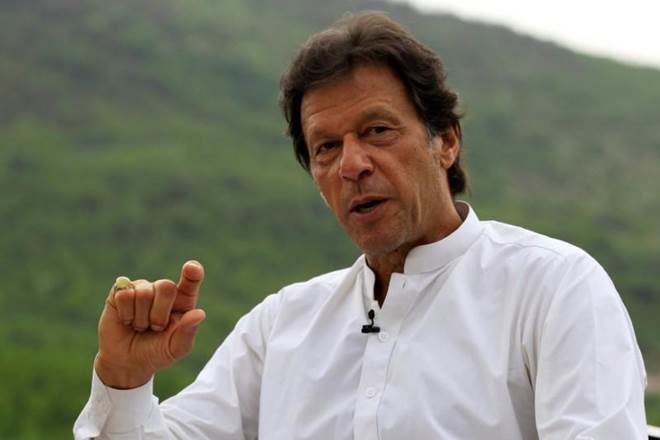Can Imran Khan turn around Pakistan’s flailing economy?

Now that the hurly burly of elections is done, it is time for the new government led by Imran Khan to translate words into action and lay the foundation of ‘Naya Pakistan’ (new Pakistan). As top-notch experts have already said, the biggest test for the cricketer-turned-politician is economy. Pakistan’s economy is in bad shape, and there are already talks about the country approaching International Monetary Fund (IMF) for a bailout.
The charismatic leader of the Pakistan Tehreek Insaaf (PTI), in his victory speech, outlined his vision to transform Pakistan's flailing economy, to rebuild institutions, to combat corruption. He sounded like a man on a sacred mission, which is exactly what Pakistan needs at the moment.
As Khan formally takes the oath of office on August 11— the first populist premier in Pakistan’s brief history— he will inherit an economy that is in shambles. How he turns it around will determine his success as the prime minister of Pakistan. It is an uphill task in a country like Pakistan where political leaders don’t always have the free hand.
Pakistan's current account deficit (CAD) — a comprehensive measure of the imbalance between imports and exports— with an increase of 4.1 per cent, has reached $18 billion. This huge deficit reveals that Pakistan gives more to the rest of the world than it receives.
The country is already facing serious energy crisis and its manufacturing industries have deeply been affected by it. The steep rise in oil prices has further compounded the situation.
The declining foreign exchange reserves are a matter of grave concern. Pakistan is confronted with declining forex reserves that is not enough to cover even two months of imports, which shows how low the bar has sunk. The depleted forex reserves stood at $9 billion dollars, which forced Pakistan to seek help from its new all-weather ally, China.
To deal with the shrinking foreign exchange reserves, China has promised to deliver $2 billion, and currently Pakistan reserves stand at $10 billion.
Furthermore, across the Asian continent, the Pakistani rupee is the worst performing currency. It can be termed a situation of financial emergency. In an ideal world, a country should have reserves to pay for at least 3-6 months of import expenses. Iran’s forex reserves stands at $135 billion (World Bank data), which is more than the United States.
Recently, Pakistan's care-taker finance minister Shamshad Akhtar criticized the weak economic management, held the previous government responsible for prevailing economic mayhem. Also, she added that the country's debt-to-GDP ratio was 72 per cent and will further worsen by the end of this fiscal year.
According to Pakistan Bureau of Statistics, during the fiscal year 2017-2018, trade deficit stood at $37.7 billion, which was 16% or 5.2 billion more than the same period last year.
Pakistan is now seeking a bailout and it is not able to decide whom to approach - the IMF (International Monetary Fund) or its closest ally China. It has borrowed a lot from China to finance the CPEC (China Pakistan Economic Corridor), an ambitious $62 billion project, which is a long-term investment and considered a game changer in the region.
According to noted economists, Pakistan’s debt is increasing fast, and Chinese plan will further worsen the situation—pushing Pakistan’s deficits to unsustainable levels. The cheap imports from China have started to hurt import-substitution industries.
CPEC will drastically affect Pakistan’s industrial sector, which is highly vulnerable to China. In order to protect its local industries and curtail trade deficit, Pakistan should impose tariff on imported goods or reserve a tariff-rate quota system to avoid additional harm. For brevity, they have to engage in voluntary export restraints, at least.
The protectionist policy is not a bad idea, as countries are returning to protectionist era to protect their domestic industries from outsiders. Specifically, the extra import duty should be imposed on goods that are produced in Pakistan.
It was believed that Mr. Khan will not extend the begging bowl like his predecessors and will look for new ways to resurrect the economy and keep the cash flowing. But, surprising as it may seem, his team has made statements that suggest that he will follow the same line, at least for now.
The problems don't end here. The ill-equipped financial system facilitates tax evasion and further assists the launder to get money out of the country. This is one of the devastating facts that brings down government revenues.
It is important to note that Khan was a staunch critic of bailout policy when the previous government had approached the IMF. And now Khan himself has set his eyes on $12 billion bailout from the IMF. It seems inevitable.
In order to ensure repayments, the IMF imposes restrictions on the economy, tight monetary policies and the government has to cut public spending and increase the amount of taxes it collects. Consequently, that breaks economy’s backbone and kills the impetus for growth. And, according to economists, a problem could only be solved by staying permanently on an IMF program, like Greece.
The populist politicians lead governments with robust economic agendas. The economic policies emerging from a populist government, however, may have negative consequences. These leaders take decisions based on political wisdom, rather than economic foresight. It remains to be seen how Khan overcomes this challenge early in his tenure.
The writer is pursuing Masters in Islamic Finance at Ahlulbayt International University Tehran. He can be reached at turi.ishtiaq@gmail.com
